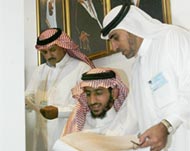Saudi men vote in civic polls
Saudi men have gone to the polls in the final round of landmark municipal elections.

Some of the voters were pressing for wider public freedoms and others jealously defending the kingdom’s Islamic identity against US pressure for reform in Thursday’s elections.
“I came to vote for candidates with an Islamic orientation. And I want this message to reach the United States and all the West,” businessman Arif al-Ghamdi said after casting his ballot at a municipality building turned into a polling station near Jedda airport.
“There are external pressures to introduce reforms here. It’s all in preparation for Americanisation,” he said, adding that he had voted for six candidates on an informal “golden list” endorsed by prominent Muslim scholars, and a seventh who is also an Islamist.
More reforms
But Salah Abd al-Razzaq, a 37-year-old school teacher, warned that the elections to pick half the members of municipal councils would be meaningless unless they were followed by more reforms.
He said:
|
“We need to have elected professional unions, for teachers and doctors for instance, to uphold these people’s rights. We also need to be able to demonstrate peacefully” |
“We need to have elected professional unions, for teachers and doctors for instance, to uphold these people’s rights. We also need to be able to demonstrate peacefully.”
Referring to the consultative body which is currently appointed, Abd al-Razzaq said: “And we want the Shura Council to be elected.”
Dozens of men, some of whom came before polls opened at about 8am (0500 GMT), cast their ballots after sipping Arabic coffee and eating dates, traditional signs of Arab hospitality, courtesy of the municipality’s head Muhammad Ali Yusuf.
Women, who have been barred from the vote, were nowhere to be seen.
All is well
Smaller numbers voted at al-Aziziya municipality, another of 45 polling stations catering for the Red Sea city of Jedda, commercial capital of the oil-rich kingdom.
“All’s going well,” said Musaid al-Sharif, one of 700 local observers deployed in polling stations across the regions covered by the third and final round of the local elections.
“We’ve had more than 100 voters” in the first couple of hours.
“The voting is proceeding in a very orderly manner in all regions,” Sultan al-Bazi, media officer for the General Elections Committee, said.
Polls were to remain open in 258 stations until about 5pm (1400 GMT) in Jedda, Taif and Islam’s holiest cities of Makka and Madina in the west, and the northern regions of al-Qassim, Hail, Tabuk, al-Jawf and the Northern Frontier.
Procedure
About 83,000 men were registered to cast their ballots in the Jedda region, including between 55,000 and 57,000 in the city itself, making up nearly 20% of eligible voters, according to official estimates.
 |
|
Saudi men must choose between |
Jedda voters can choose up to seven representatives, one in each of the city’s constituencies, from 500 contenders coveting the seven elected seats on the local council.
The clerics-backed candidates are seen as having good chances of winning after they survived an attempt by rivals to disqualify them from running, on grounds that they breached election rules by forming a coalition.
A total of 244 seats are up for grabs in the third round, which will complete the election of half the members of 178 municipal councils across Saudi Arabia, the world’s top oil exporter.
The remaining seats will be filled by the government.
Cautious reform
In all, more than 4600 candidates are courting the votes of about 333,000 registered voters aged over 21 and excluding military personnel.
The first two stages took place in the capital Riyadh and outlying areas on 10 February and in the oil-rich Eastern Province and southwestern regions on 3 March.
Saudi leaders have responded to US plans to promote democracy in the Middle East with a cautious process of reform they say is tailored to domestic specifications.